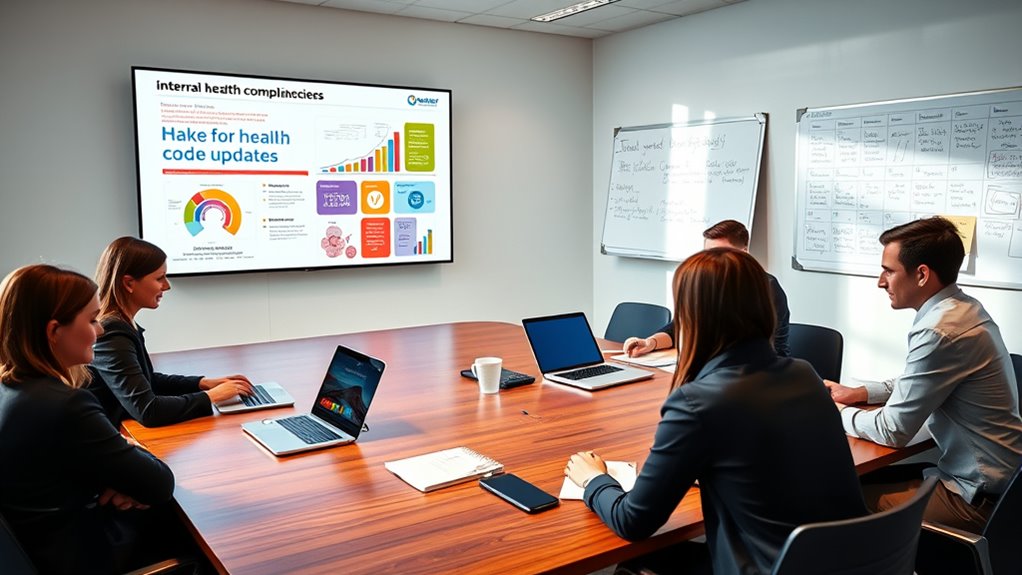To stay current with health code changes, regularly check health department websites and subscribe to industry updates or newsletters. Participate in relevant training sessions and workshops to understand new regulations and practical applications. Engage with professional networks or associations for expert insights, and use technology tools for compliance tracking. Establish routine internal reviews and audits to catch issues early. Keeping this proactive approach guarantees you’re always prepared—keep going to learn more about maintaining compliance effectively.
Key Takeaways
- Regularly monitor health department websites and industry publications for the latest policy updates.
- Participate in relevant training, workshops, and industry events to stay informed on current health regulations.
- Utilize technology tools and internal review processes to track changes and ensure ongoing compliance.
- Engage with professional associations and networks for expert insights and updates on health code standards.
- Conduct routine internal audits and reviews to proactively adapt procedures and maintain safety standards.
Monitoring Official Health Department Websites and Bulletins

Monitoring official health department websites and bulletins is essential to stay informed about the latest health code updates. By regularly checking these sources, you ensure you’re aware of regulatory alerts that signal immediate changes or concerns. These alerts often highlight urgent policy revisions or new requirements that could impact your operations. Staying current helps you avoid compliance issues and demonstrates your commitment to public health standards. Many health departments also publish detailed bulletins explaining the rationale behind policy revisions, giving you context to adapt your practices effectively. Dedicate time each week to review these updates, and consider setting up notifications if available. This proactive approach keeps you ahead of potential changes and ensures your business remains compliant with evolving health regulations. Additionally, understanding the role of contrast ratio can help you better interpret visual information related to health and safety signage, ensuring clarity in your environment.
Subscribing to Industry Newsletters and Updates

To stay ahead of evolving health regulations, subscribing to industry newsletters and updates offers a direct line to the latest news and expert insights. These subscriptions provide timely regulatory alerts, keeping you informed about changes as soon as they happen. They also include concise policy summaries that clarify complex regulations, making it easier for you to understand and implement necessary adjustments. Regularly receiving these updates ensures you’re not caught off guard by unexpected shifts in health codes. Plus, many newsletters tailor content to specific industries, so you get relevant information without the noise. By actively subscribing, you create a proactive approach to compliance, reducing risks and maintaining high standards. It’s an efficient way to stay current without constantly monitoring multiple sources. Additionally, staying informed about regulatory changes related to food safety and delivery logistics can help you adapt quickly and ensure ongoing compliance. Keeping up with industry standards through these updates also fosters continued best practices within your operations. Incorporating industry-specific guidelines can further enhance your ability to meet evolving requirements efficiently. Regular updates on health code updates ensure your protocols remain aligned with current regulations and safety practices. Staying connected to trusted sources also allows for early identification of issues, enabling you to address potential problems proactively.
Participating in Relevant Training and Workshops

Participating in relevant training and workshops is essential for staying compliant with evolving health codes, as they provide up-to-date knowledge and practical skills directly applicable to your operations. These sessions often include practical scenarios and case studies that help you understand real-world applications of new regulations. Engaging actively in these trainings allows you to identify potential compliance issues early and implement effective solutions. They also give you the opportunity to ask questions and clarify uncertainties, ensuring you fully grasp complex changes. By regularly attending workshops, you stay ahead of regulatory updates, reducing the risk of violations and penalties. Additionally, paint spray techniques can support maintaining high standards of safety and compliance in your workplace. Recognizing the importance of understanding narcissistic traits can help in managing workplace dynamics effectively. Staying informed about regulatory updates related to health and safety is crucial for maintaining a compliant environment. Ultimately, these educational experiences empower you to maintain high standards of safety and compliance in your workplace.
Engaging With Professional Networks and Associations

Engaging with professional networks and associations helps you stay connected and informed about the latest health code developments. Attending events offers valuable networking opportunities, while reading industry publications keeps you updated on key changes. By actively participating, you’ll enhance your knowledge and build relationships that support your professional growth. Engaging with Self Watering Plant Pots discussions can also provide insights into innovative approaches and problem-solving strategies that impact health standards.
Networking Opportunities at Events
Attending events offers a prime opportunity to connect with fellow professionals and expand your network. These gatherings foster peer collaboration and can open doors to new partnerships. To maximize your experience: 1. Engage actively in discussions and workshops to build meaningful relationships. 2. Seek out sponsorship opportunities to increase your visibility and demonstrate commitment. 3. Join relevant professional associations to stay connected beyond the event and access ongoing peer collaboration. 4. Developing your Cultural Intelligence can enhance your ability to navigate diverse professional environments and build more effective relationships. Understanding family dynamics in the industry can also provide valuable context for collaborations and negotiations. Networking at these events helps you stay current with health code changes by exchanging insights with industry leaders. It also provides a platform to share best practices and learn from others’ experiences. By participating fully, you position yourself as a proactive professional dedicated to continuous improvement and staying ahead of the curve. Engaging in analytical cookies at these events can help you better understand industry trends and attendee interests, further enriching your networking efforts. Additionally, staying informed about latest health regulations ensures that your practices remain compliant and up-to-date.
Staying Informed Through Publications
Staying informed about the latest health code updates often hinges on regularly consulting industry publications and connecting with professional networks. These sources provide crucial regulatory updates, helping you stay ahead of changes that impact your work. By engaging in publication analysis, you can interpret complex regulatory language and understand its practical implications. Subscribing to reputable journals and newsletters ensures you receive timely alerts about new regulations and policy shifts. Participating in professional associations also grants access to expert insights and discussions, which deepen your understanding of upcoming changes. Consistent review of these materials helps you adapt proactively, ensuring compliance and maintaining best practices. Staying current with skincare patch guidelines further enhances your ability to implement safe and effective treatments. Additionally, understanding health and wellness trends allows you to incorporate innovative approaches into your practice. Ultimately, investing in publication analysis and network engagement keeps you well-informed, so you’re always prepared for evolving health code standards.
Utilizing Technology and Compliance Management Tools

Technology and compliance management tools are transforming how health code regulations are implemented and monitored. They help you stay ahead by streamlining processes and reducing errors. For example, these tools enable you to:
Technology simplifies health code compliance, ensuring accuracy and proactive management.
- Maintain digital documentation effortlessly, ensuring records are accurate and easily accessible.
- Set up automated alerts that notify you of upcoming deadlines or compliance issues, preventing violations.
- Track changes in regulations and update your procedures quickly, keeping your operations compliant.
- Incorporate industry-specific regulatory trends to proactively adapt your compliance strategies.
Establishing Regular Internal Review Processes

Building on the efficiencies gained through technology, setting up regular internal review processes guarantees ongoing compliance and continuous improvement. Schedule routine internal audits to identify gaps and ensure health code standards are met consistently. These audits help you catch issues early and implement corrective actions promptly. Incorporate staff training into your review process, so your team stays updated on recent health code changes and best practices. Regular reviews also foster accountability and promote a culture of compliance. Use checklists and digital tools to streamline audits and training records. By establishing a cycle of ongoing assessments and education, you’ll stay ahead of evolving regulations and maintain a safe, compliant environment for staff and customers alike.
Frequently Asked Questions
How Often Do Health Code Regulations Typically Change?
Health code regulations typically change periodically to improve safety standards. You should stay informed about updates to inspection protocols and training requirements, as these often evolve with new health challenges. Regulations may change annually or every few years, depending on local or national authorities. Regularly reviewing official health department updates guarantees you’re compliant and prepared for inspections. Staying proactive helps you adapt quickly and maintain high safety standards in your operations.
What Are the Common Challenges in Staying Current With Updates?
Imagine you’re in a time machine, trying to keep up with constant health code updates. You face challenges like limited staff training and outdated technology tools. Staying current demands regular education and efficient systems to track changes. Without these, you risk non-compliance. Overcoming these hurdles requires proactive efforts, continuous learning, and adopting modern tech solutions, ensuring you’re always aligned with the latest health regulations and maintaining high standards.
How Can Small Businesses Effectively Track Health Code Modifications?
You can effectively track health code modifications by leveraging digital tools that provide real-time updates, ensuring you’re always informed. Regularly conducting employee training sessions helps your team stay aware of new requirements. Subscribing to industry newsletters or official health department alerts also keeps you current. Combine these strategies to create a proactive approach, making it easier to adapt quickly and maintain compliance without missing critical changes.
Are There Any Legal Consequences for Non-Compliance With New Health Codes?
When you fail to adhere to new health codes, legal penalties can include fines, closure orders, or even lawsuits. Compliance enforcement is strict, and authorities actively monitor businesses for violations. To avoid these consequences, you must stay informed about health code updates, implement necessary changes promptly, and maintain documentation of compliance. Being proactive helps protect your business from legal issues and ensures you provide a safe environment for your customers and staff.
What Resources Are Available for Quick Updates During Emergencies?
They say, “Knowledge is power,” and in emergencies, staying informed is vital. You can rely on digital alerts and industry newsletters for quick updates on health code changes. These resources deliver real-time information straight to your device, helping you act swiftly. Subscribe to trusted industry newsletters and enable digital alert notifications to make certain you’re always prepared, minimizing risks and maintaining compliance during urgent situations.
Conclusion
Staying current with health code changes is essential, as over 70% of compliance issues stem from outdated knowledge. By regularly monitoring official websites, subscribing to updates, and engaging in training, you guarantee your practices meet the latest standards. Leveraging technology and internal reviews keeps you proactive. Remember, staying informed isn’t just about compliance—it’s about protecting your clients and reputation in a constantly evolving landscape. Keep learning, adapting, and leading in health standards.









